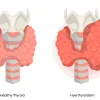How is Hypothyroidism Diagnosed?
Hypothyroidism is a condition in which the thyroid gland fails to produce enough thyroid hormone, leading to various health issues. It is important to diagnose hypothyroidism early to prevent complications and manage the condition effectively. In this article, we will explore how hypothyroidism is diagnosed and provide information tailored to the Indian population.
Understanding the Symptoms
Before diagnosing hypothyroidism, it is crucial to recognize its symptoms. Common signs and symptoms of hypothyroidism include:
- Fatigue and weakness
- Weight gain and difficulty losing weight
- Dry skin and hair
- Cold intolerance
- Muscle aches and stiffness
- Constipation
- Depression and mood swings
- Irregular menstrual cycles (in women)
- Slowed heart rate
If you experience any of these symptoms, it is advisable to consult a healthcare professional for a thorough evaluation.
Medical History and Physical Examination
The first step in diagnosing hypothyroidism involves a comprehensive medical history and physical examination. Your doctor will discuss your symptoms, medical history, and any family history of thyroid disorders. They will also conduct a physical examination to check for signs such as dry skin, hair loss, and a swollen thyroid gland (goiter).
Thyroid Function Tests
Thyroid function tests are essential for diagnosing hypothyroidism. These tests measure the levels of thyroid-stimulating hormone (TSH) and thyroid hormones (T3 and T4) in the blood.
- TSH Test: TSH is produced by the pituitary gland and stimulates the thyroid gland to produce thyroid hormones. In hypothyroidism, TSH levels are elevated because the pituitary gland tries to compensate for the low levels of thyroid hormones. A high TSH level suggests an underactive thyroid.
- T4 Test: T4 is the primary thyroid hormone produced by the thyroid gland. In hypothyroidism, T4 levels are usually low, confirming the diagnosis.
In some cases, the healthcare provider may also order a T3 Test to measure the levels of the active thyroid hormone T3. However, T3 levels are often within the normal range in hypothyroidism, so the TSH and T4 tests are usually sufficient for diagnosis.
Additional Diagnostic Tests
If hypothyroidism is confirmed, your healthcare provider may recommend additional tests to determine the underlying cause of the condition. These tests may include:
- Antibody Tests: To check for the presence of antibodies associated with autoimmune thyroid disorders such as Hashimoto’s thyroiditis.
- Thyroid Ultrasound: To evaluate the structure of the thyroid gland and check for any abnormalities.
- Thyroid Scan: Rarely, a thyroid scan may be performed to determine the functionality and size of the thyroid gland.
Importance of Early Diagnosis and Treatment
Early diagnosis and treatment of hypothyroidism are crucial to prevent complications and manage the condition effectively. If left untreated, hypothyroidism can lead to weight gain, high cholesterol levels, depression, and an increased risk of heart disease.
Once diagnosed, hypothyroidism can be effectively managed with medication, such as synthetic thyroid hormones. Regular follow-up appointments and thyroid function tests are necessary to monitor hormone levels and adjust the medication dosage if needed.
Introducing Fitpaa: Your Health and Fitness Solution
If you are looking for a comprehensive health and fitness solution to support your overall well-being, we recommend exploring the Fitpaa app. Fitpaa is an end-to-end AI-driven metabolism monitoring and management technology that helps individuals achieve their health and fitness goals.
Fitpaa uses the latest research in lifestyle medicine and behavioral therapy to optimize your metabolism and strengthen all 11 organ systems. With its personalized Fitpaa Capsule, consisting of medical therapy, exercise therapy, nutrition therapy, and cognitive behavior therapy, you can achieve your health and fitness goals with a 100% guarantee.
The Fitpaa app provides real-time guidance, habit-building techniques, and a virtual workout trainer to keep you motivated and on track. Whether your goal is weight loss, athletic bodybuilding, disease management, or simply staying fit and healthy, Fitpaa has tailored solutions to suit your needs.
To experience the joy of getting fit and excel in life, download the Fitpaa app now. We are here to help you achieve your health and fitness goals with guaranteed results. Your well-being is our mission!
Remember, with Fitpaa, you not only get a Fitpaa mobile app but also a personal health and fitness team comprising fitness planners, coaches, nutritionists, and doctors who will guide you every step of the way. Our goal-oriented services come with a lifetime validity, ensuring that you achieve your goals with a 100% guarantee.
Don’t hesitate to take the first step towards a healthier and happier life. Request a trial on the Fitpaa app today and let us help you transform your life.
Note: Fitpaa is not related to the diagnosis of hypothyroidism. This information on diagnosing hypothyroidism is provided to give you an understanding of the topic. For medical diagnosis and treatment, please consult a qualified healthcare professional.









